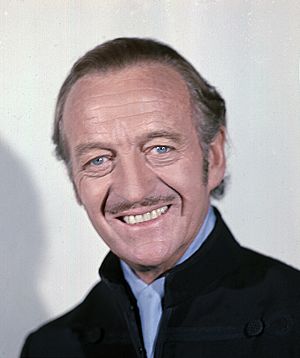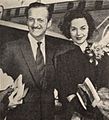David Niven facts for kids
Quick facts for kids
David Niven
|
|
|---|---|

Niven in 1973. Photograph by Allan Warren
|
|
| Born |
James David Graham Niven
1 March 1910 London, England
|
| Died | 29 July 1983 (aged 73) Château-d'Œx, Switzerland
|
| Resting place | Château-d'Œx Cemetery |
| Education | Heatherdown Preparatory School Stowe School |
| Alma mater | Royal Military College, Sandhurst |
| Occupation | Actor, author |
| Years active | 1932–1983 |
| Spouse(s) |
Primula Susan Rollo
(m. 1940; died 1946)Hjördis Genberg
(m. 1948) |
| Children | 4, including David Jr. |
| Military career | |
| Allegiance | |
| Service/ |
|
| Years of service | 1930–1933 1940–1945 |
| Rank | |
| Service number | 44959 |
| Unit | Highland Light Infantry Rifle Brigade (Prince Consort's Own) |
| Battles/wars | World War II |
| Awards | |
David Niven (born James David Graham Niven, 1 March 1910 – 29 July 1983) was a famous British actor and writer. He won an Academy Award for Best Actor for his role in the movie Separate Tables (1958).
Niven starred in many popular films. These include A Matter of Life and Death (1946), Around the World in 80 Days (1956), The Pink Panther (1963), and Casino Royale (1967).
Born in London, Niven went to Heatherdown Preparatory School and Stowe School. He then joined the Royal Military College, Sandhurst. After Sandhurst, he became an officer in the British Army. He later became interested in acting and got his first small role in a film in 1932.
Niven left the army in 1933 and moved to Hollywood. He quickly found an agent and started getting small parts in movies. His role in Mutiny on the Bounty (1935) helped him get a contract with the famous producer Samuel Goldwyn.
He soon began starring in major films like Wuthering Heights (1939). When World War II began, Niven returned to Britain to rejoin the army. After the war, he continued his successful acting career. He also became a successful author, writing several books.
Contents
David Niven's Early Life and Family
David Niven was born on March 1, 1910, in London. He was named David because he was born on Saint David's Day. His father, William Niven, was from Scotland. William Niven was killed in World War I in 1915.
David's mother, Henrietta, was born in Wales. Her father, Captain William Degacher, was killed in the Anglo-Zulu War in 1879. After his father died, David's mother remarried in 1917 to Sir Thomas Comyn-Platt. The family then moved to the Isle of Wight.
David Niven was sent to boarding school after his mother remarried. He found it a difficult time. He was known for playing pranks, which led to him being expelled from Heatherdown Preparatory School when he was 10. This meant he couldn't go to Eton College, which was a big disappointment for his family.
He later attended Stowe School. The headmaster, J. F. Roxburgh, was very different from his previous teachers. He was kind and encouraged students' interests. Niven felt that Roxburgh made every student feel important.
In 1928, when Niven was 18, he met 15-year-old Margaret Whigham. They fell in love, but their parents did not approve. Margaret remained fond of Niven throughout his life.
Military Service and War Heroism
In 1928, Niven went to the Royal Military College, Sandhurst. He graduated in 1930 and became a second lieutenant in the British Army. Sandhurst helped him develop the "officer and gentleman" style he was known for.
He was assigned to the Highland Light Infantry and served in Malta and Dover. Niven grew tired of the army during peacetime. He felt there were no chances for him to advance. His decision to leave came after a long lecture that made him late for dinner. He asked the speaker for the time, which was seen as disrespectful.
After this, Niven resigned from the army in 1933 and moved to America. He tried selling whisky and promoting rodeos before arriving in Hollywood in 1934.
Niven's Role in World War II
The day after Britain declared war on Germany in 1939, Niven returned home. He was the only British star in Hollywood to do this. He rejoined the Rifle Brigade. He wanted more action, so he joined the Commandos. He commanded a special unit called "Phantom," which was a secret reconnaissance and signals group.
Niven also worked with the Army Film and Photographic Unit. He even had a small part in a secret operation that used an actor to pretend to be General Sir Bernard Montgomery. He also acted in two wartime films, The First of the Few (1942) and The Way Ahead (1944). These films aimed to support the British war effort.
Niven was promoted to lieutenant-colonel. He took part in the Allied invasion of Normandy in June 1944. He rarely spoke about his war experiences. However, he did share a few stories in his autobiography. He mentioned private conversations with Winston Churchill. Churchill once told him, "Young man, you did a fine thing to give up your film career to fight for your country."
Niven ended the war as a lieutenant-colonel. When he returned to Hollywood, he received the Legion of Merit, an American military award. This award recognized his work in setting up a radio station for Allied forces.
David Niven's Film Career and Success
After the war, Niven continued his acting career in England. He starred in A Matter of Life and Death (1946), which was very popular.
Return to Hollywood and Comeback
Niven returned to Hollywood. Sadly, his first wife died in an accident. His career faced some challenges after a few films were not very successful.
He decided to try acting on Broadway, starring in a play called Nina. This led to him being cast in the film The Moon Is Blue (1953). The movie was a big hit, and Niven won a Golden Globe Award for his role.
His career then took off again. He starred in Carrington V.C. (1954), which earned him a BAFTA nomination.
Around the World in 80 Days and Oscar Win
Niven's career reached new heights when he played Phileas Fogg in Around the World in 80 Days (1956). This movie was a huge success and won the Academy Award for Best Picture.
He also starred in the TV show Four Star Playhouse. Niven, Ida Lupino, Dick Powell, and Charles Boyer co-owned the company that produced the show.
In 1958, Niven won the Academy Award for Best Actor for his role in Separate Tables. He was the only person to win an Oscar while also hosting the awards ceremony. He appeared on screen for only 23 minutes in the film, making it the shortest performance to win a Best Actor Oscar.
After winning the Oscar, Niven's career continued to be very successful. He hosted his own TV show, The David Niven Show. He also starred in popular comedies like Please Don't Eat the Daisies (1960) with Doris Day.
International Star and Later Roles
Niven became an international star with the action film The Guns of Navarone (1961). This led to more war and action movies, such as 55 Days at Peking (1963).
He returned to comedy with The Pink Panther (1963), which was another huge success. In 1964, he starred in the TV series The Rogues.
In 1967, Niven played James Bond in Casino Royale. He was the only actor to play Bond in a film not made by Eon Productions. The author of the James Bond books, Ian Fleming, had originally wanted Niven to play Bond.
Niven continued to act in many films throughout the 1970s. These included Murder By Death (1976) and Death on the Nile (1978). His last major film role was in Better Late Than Never (1983). He also made cameo appearances in two more Pink Panther films in 1982.
David Niven's Writing Career
David Niven wrote four books. His first book, Round the Rugged Rocks, was a novel published in 1951.
In 1971, he published his autobiography, The Moon's a Balloon. This book was very popular, selling over five million copies. He followed it with Bring On the Empty Horses in 1975, which shared fun stories from Hollywood's "Golden Age." Niven was a great storyteller, and sometimes he would tell stories that had happened to others as if they had happened to him.
In 1981, Niven published another successful novel, Go Slowly, Come Back Quickly. This book was set during and after World War II and used his own experiences. He was working on a third novel when he passed away.
Personal Life and Family
In 1940, Niven met Primula "Primmie" Susan Rollo. They married on September 16, 1940. They had two sons, David Jr. (born 1942) and James Graham (born 1945). Sadly, Primmie died in 1946 at the age of 28 after an accident.
In 1948, Niven married Hjördis Paulina Tersmeden, a Swedish fashion model. Niven bought a chalet in Château-d'Œx in Switzerland in 1960. He lived there near friends like Deborah Kerr and Peter Ustinov. He spent his time between his chalet in Switzerland and Cap Ferrat in France.
Later Years and Passing
In 1980, Niven began to feel tired and his voice changed. He was diagnosed with amyotrophic lateral sclerosis (ALS) later that year. This is a serious illness that affects muscles.
In February 1983, Niven was briefly in the hospital. He passed away at his home in Château-d'Œx on July 29, 1983, at the age of 73. He was buried in the local cemetery.
David Niven's Legacy
A special service was held for Niven in London in October 1983. Many famous people attended, including Prince Michael of Kent and Lord Olivier.
In 1985, Niven was honored with a British postage stamp. This was part of a series celebrating "British Film Year." His appearance also inspired characters like Commander Norman in the Thunderbirds TV show and the villain Sinestro in Green Lantern comic books.
Images for kids
-
David Niven with Errol Flynn in The Dawn Patrol (1938)
-
With Loretta Young in Eternally Yours (1939)
-
With Leslie Howard in The First of the Few (1942)
-
The cast of The Rogues (1964) with Charles Boyer, Gig Young, Niven, Robert Coote and Gladys Cooper
-
Clark Gable, Cary Grant, Bob Hope, and Niven laughing in the 1950s
-
Niven with his family at Copenhagen Airport (5 August 1958)
See also
 In Spanish: David Niven para niños
In Spanish: David Niven para niños













